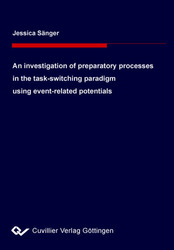| Departments | |
|---|---|
| Book Series (97) |
1381
|
| Nachhaltigkeit |
3
|
| Gesundheitswesen |
1
|
| Humanities |
2370
|
| Medienwissenschaften | 16 |
| Theology | 57 |
| Philosophy | 102 |
| Law | 423 |
| Economics | 852 |
| Social sciences | 417 |
| Sports science | 48 |
| Psychology | 233 |
| Educational science | 190 |
| History | 183 |
| Art | 111 |
| Cultural studies | 166 |
| Literary studies | 117 |
| Linguistics | 88 |
| Natural Sciences |
5407
|
| Engineering |
1798
|
| Common |
98
|
|
Leitlinien Unfallchirurgie
5. Auflage bestellen |
|
Advanced Search
An investigation of preparatory processes in the task-switching paradigm using event-related potentials (English shop)
Jessica Sänger (Author)Preview
Table of Contents, Datei (140 KB)
Extract, Datei (180 KB)
The ability to flexibly adjust behaviour to changing environmental demands in order to achieve a certain task goal is a crucial requirement of our everyday life. It is thought to be an important component of the cognitive control of behaviour. The task-switching paradigm can be used to examine those executive control processes. A common finding is that alternating from one task to another is associated with a sizable decrement in performance shown as a substantial reaction time and error cost. Although these task-switching costs can be reduced by advance task preparation, residual task-switching costs remain. Neuropsychological studies suggest that the critical cortical region for cognitive control is the prefrontal cortex. However, neuroimaging studies that investigated task-switching processes have rather emphasized the interplay of prefrontal and parietal cortices. This raises the fundamental question about the different contributions of prefrontal and parietal areas in cognitive control. The present study intended to investigate the reliability and validity of electrophysiological correlates that are involved in task switching. It additionally raised the question if task-switching costs reflect cognitive control processing at all. Five experiments were conducted. All of which were theoretically driven variations of a well established cued task-switching paradigm, where participants randomly switched between two simple tasks. The results of all Experiments showed that when subjects switch between tasks, performance is poorer than when they repeated the task, even when preparation time was long. Additionally, event-related potentials (ERPs) have been recorded. It could have been shown that advanced S-R retrieval is reflected in a cue-related parietal P3. This component increases reliably in amplitude when a new S-R mapping has to be defined (Experiment 1 – 4) or a final response decision can be performed in advance (Experiment. 5). Although it does not explain the behavioural task-switching costs, this preparation effect might also be interpreted to reflect cognitive control processes due to the flexible and rapid configuration of response dispositions. Across all experiments the target-related slow wave was consistently related to the behavioural task-switching costs. This component occurs around the moment of the response. Thus, it can be supposed to reflect a process closely related to the execution of the response like the final implementation of a selected S-R mapping. This indicates that task-switching costs, measured with the cued task-switching paradigm, might arise from interference when transferring a selected S-R mapping into a motor program rather than reflecting cognitive control or executive functions.
| ISBN-13 (Printausgabe) | 3867271720 |
| ISBN-13 (Hard Copy) | 9783867271721 |
| ISBN-13 (eBook) | 9783736921726 |
| Final Book Format | A5 |
| Language | English |
| Page Number | 154 |
| Edition | 1 |
| Volume | 0 |
| Publication Place | Göttingen |
| Place of Dissertation | München |
| Publication Date | 2007-03-01 |
| General Categorization | Dissertation |
| Departments |
Psychology
|








